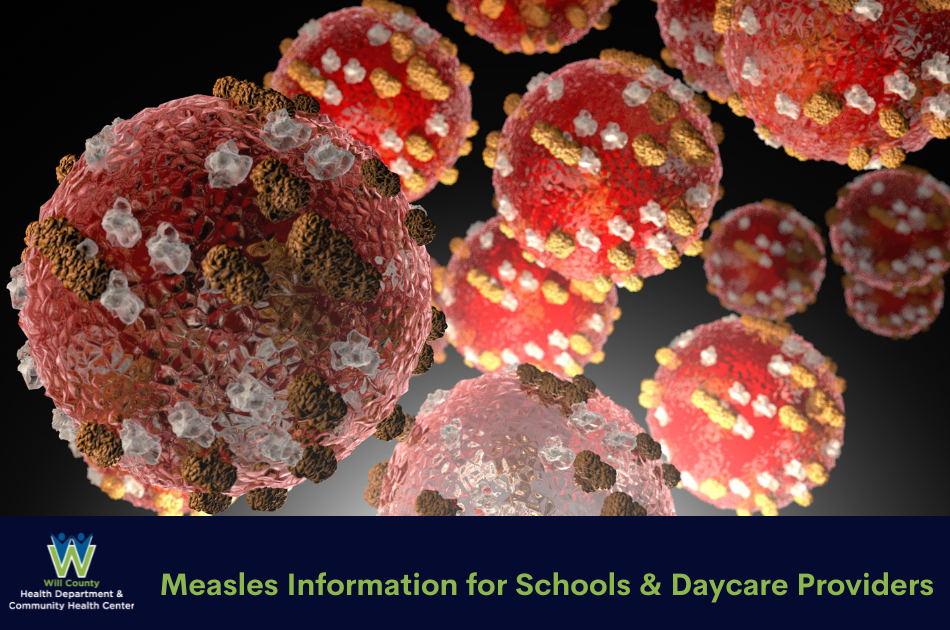Measles Information For Schools & Daycare
WILL COUNTY HEALTH DEPARTMENT

The Will County Health Department’s Communicable Disease/Epidemiology program has released information to Will County Schools and Daycare Providers regarding the measles outbreak in the Chicago area.
What is measles?
Measles is a very contagious respiratory disease caused by a virus. Before the measles vaccine became available, measles was a common childhood disease. Measles is considered the most deadly of all childhood rash/fever illnesses. Symptoms include rash, high fever, cough, runny nose, and red, watery eyes.
How do people get measles?
Measles is easily spread from person to person. When an infected person talks, coughs, or sneezes, the virus is released into the air and enters another person’s body through the nose, mouth, or throat. People can also become sick if they come in contact with the mucus or saliva (spit) from an infected person. The measles virus can live on contaminated surfaces and in the air for up to two hours. Measles may be transmitted from 4 days before through 4 days after rash onset.
Are there complications with a measles virus infection?
Yes. Common complications include ear infections and diarrhea. Severe complications include pneumonia (infection of the lungs), encephalitis (swelling of the brain), and death. Measles may cause pregnant women to give birth prematurely or have low-birth-weight babies.
How can a school prevent and control measles?
- Get vaccinated! Measles is a vaccine-preventable disease. One dose of measles vaccine is about 93% effective at preventing measles if exposed to the virus and two doses are about 97% effective. For IL school vaccination requirements, visit: https://dph.illinois.gov/topics-services/prevention-wellness/immunization.html
- Check immunization records. Review the immunization status for all children AND staff members.
- Practice healthy habits:
– Don’t attend school and work while you are sick.
– Wash hands frequently. If soap and water are not available, use an alcohol-based hand rub that contains at least 60% alcohol.
– Cover your mouth and nose with a tissue or your sleeve when coughing or sneezing.
– Avoid sharing utensils, water bottles, or other items contaminated by saliva or respiratory secretions.
What is proof of immunity?
Proof of immunity (protection against measles) includes at least one of the following:
- Written documentation of age-appropriate measles vaccination (one or two doses)
- Laboratory evidence of immunity (blood test) or laboratory confirmation of measles disease
- Birth before 1957 (Adults born before 1957 are more likely to have had measles as a child and are generally, but not always, considered immune.)
If a person is exposed, does that mean they will get sick or infected with measles?
Exposure occurs when a person is in the same space (e.g. room, office, waiting room, building) with someone who has measles or occupies this space for up to 2 hours after the infected person has left. People are less likely to get sick with measles if they have been appropriately vaccinated. Approximately 90 percent of susceptible people will get measles if they are exposed to someone with the disease.
When should children and staff be excluded from school?
The following are general guidelines for exclusion. Please note that all decisions to exclude children and staff should be made in consultation with the Will County Health Department (Phone 815-727-8481). WCHD Communicable Disease staff can help you determine the correct dates for exclusion.
- Exclude children and staff who have measles until they are no longer contagious (through 4 days after rash onset).
- Exclude exposed children and staff members who do not have proof of immunity from day 5 after the first exposure through day 21 following the last exposure.
Should schools be closed during an outbreak of measles?
The Illinois Department of Health (IDPH) and Will County Health Department (WCHD) generally do not recommend school closure for outbreaks of infectious diseases. The decision to close a school is an administrative decision and one that should be made only after consultation with public health officials and the district medical personnel.
